Delilah S. Dawson's Blog, page 30
July 15, 2012
end result trumps process

Did you see a different post here, a moment ago?
Nevermind.
Instead, I present you with a picture of me on the first day of FandomFest,
when I got to announce my last book sale.
This is how I'm going to look when I finish this big revision.
TRIUMPHANT.
And slightly mad.
Published on July 15, 2012 18:37
July 14, 2012
On Rejection: Or, Everybody Gets Punched in the Grief Bone
In exploring some writing themes this week, I've been asked one question several times:
How do you deal with rejection, and how do you keep going when you want to quit?
It's a good question, but a painful one. Here's the honest truth:
If you want to be published, you are going to be rejected A LOT.
First by agents. Then by editors. Then by readers and book bloggers.
So here's how I deal with it.
1. Separate yourself from your work.
When people offer criticism of your story or novel, they are not criticizing *you*. Learn to embrace criticism, consider it carefully, and use it to improve your writing.
2. SEPARATE YOURSELF FROM YOUR WORK.
I'm really serious about this one. Until you've made this mental leap, you don't need to bother trying to get published, whether traditionally or via self-publishing. You'll just make yourself miserable.
3. Never, ever respond to rejection with anger.
If you're prone to knee-jerk reactions, put a brick on your knee. You will never get an agent, sell a book, or find new readers by being a defensive jerk. You're never going to change someone's mind on the internet. Responding to an agent's rejection with an inflammatory email doesn't just blackball you from that agent; publishing is a small world, and word gets around. And responding to negative book reviews is like rolling around in chum and jumping into a shark tank.
4. When possible, use rejection to your advantage.
If you are very lucky and getting close, an agent might offer some advice on your writing. And this is great! Remember that these people spend all day reading books. Although opinions may vary, they know their stuff. I even thanked some of the agents who rejected me in the Acknowledgments of my first book. If your agented book gets to the submission table and the editor is kind enough to explain why they didn't buy it, pay very close attention. No matter how talented you are, there's always something about your writing that can be improved.
5. But! Try to avoid reading negative book reviews.
At first, I read the one-star reviews, hoping to find ways to improve my next book. But, honestly, by the time someone gives you a bad review, their complaints are more painful than uplifting and about something that you can't change, like your book cover or, say, the fact that vampires are *so* done. And negative reviews can sometimes criticize the writer instead of the writing, which will feel like a personal attack, even if it isn't one. I believe that once the book is out in the world, reviewers have every right to say whatever they wish... just please don't tell me about it, because it makes me feel terrible.
6. If it makes you feel better, look at the Amazon or Goodreads reviews for your very favorite book.
Chances are, thousands of people hate it. That always makes me feel better. I mean, there are people out there who didn't finish Outlander or thought it was the worst book ever written. Of course people are going to hate my book! No matter how good your writing might be, it still comes down to personal taste.
7. When all else fails, inch towards daylight.
I borrowed this concept from fantasy writer Matt Stover. No matter how bad the situation is, you can probably move one inch, right? Rejection is like that. When I was querying, I sent out a new query every time I received a rejection. It made me feel like there was one more bit of hope out in the world. And when I finally realized that my first book was dead in the water, I opened a blank document and started writing the next book. Any forward motion is better than holding still.
8. Remember that every writer has been rejected.
Isaac Asimov, Stephen King, J.K. Rowling, Stephenie Meyer-- every writer who now lives in their own castle has been rejected by agents and editors, often dozens of times. Publishing is finicky and strange and random. I've never heard of a single writer who struck it big with their first query, their first book, and their first huge sale. Most "instant success" stories involve years of hard, thankless toil and a box (or inbox) full of form rejections.
9. Never make major decisions based on rejection.
If you're going to give up writing, don't do it because of rejection. If you're going to self-publish, don't do it because you're sick of being rejected. Do it because you want complete creative control of your story and are willing to do the work and do it right, hiring a professional editor and cover artist. Don't quit your job or break up with someone or do anything major right after being rejected. Rejection destroys your ability to look at the big picture unemotionally and make informed decisions.
10. Don't think it gets any easier.
Rejection never gets easy. I still cry when I get big edit letters outlining how flawed my books are and how much work they still require. I have books my agent doesn't like enough to move forward. I have books go out on submission and not sell. Revising is always hard. Hitting DELETE always makes me wince. When I'm sitting at a book signing, and someone stands in front of me and picks up my book and then puts it right back and doesn't even make eye contact, it's like being punched in the grief bone.
Every stage of a writing career involves being rejected, and that's why the list goes right back to #1:
SEPARATE YOURSELF FROM YOUR WORK.
Any other questions? Ask away!
*
How do you deal with rejection, and how do you keep going when you want to quit?
It's a good question, but a painful one. Here's the honest truth:
If you want to be published, you are going to be rejected A LOT.
First by agents. Then by editors. Then by readers and book bloggers.
So here's how I deal with it.
1. Separate yourself from your work.
When people offer criticism of your story or novel, they are not criticizing *you*. Learn to embrace criticism, consider it carefully, and use it to improve your writing.
2. SEPARATE YOURSELF FROM YOUR WORK.
I'm really serious about this one. Until you've made this mental leap, you don't need to bother trying to get published, whether traditionally or via self-publishing. You'll just make yourself miserable.
3. Never, ever respond to rejection with anger.
If you're prone to knee-jerk reactions, put a brick on your knee. You will never get an agent, sell a book, or find new readers by being a defensive jerk. You're never going to change someone's mind on the internet. Responding to an agent's rejection with an inflammatory email doesn't just blackball you from that agent; publishing is a small world, and word gets around. And responding to negative book reviews is like rolling around in chum and jumping into a shark tank.
4. When possible, use rejection to your advantage.
If you are very lucky and getting close, an agent might offer some advice on your writing. And this is great! Remember that these people spend all day reading books. Although opinions may vary, they know their stuff. I even thanked some of the agents who rejected me in the Acknowledgments of my first book. If your agented book gets to the submission table and the editor is kind enough to explain why they didn't buy it, pay very close attention. No matter how talented you are, there's always something about your writing that can be improved.
5. But! Try to avoid reading negative book reviews.
At first, I read the one-star reviews, hoping to find ways to improve my next book. But, honestly, by the time someone gives you a bad review, their complaints are more painful than uplifting and about something that you can't change, like your book cover or, say, the fact that vampires are *so* done. And negative reviews can sometimes criticize the writer instead of the writing, which will feel like a personal attack, even if it isn't one. I believe that once the book is out in the world, reviewers have every right to say whatever they wish... just please don't tell me about it, because it makes me feel terrible.
6. If it makes you feel better, look at the Amazon or Goodreads reviews for your very favorite book.
Chances are, thousands of people hate it. That always makes me feel better. I mean, there are people out there who didn't finish Outlander or thought it was the worst book ever written. Of course people are going to hate my book! No matter how good your writing might be, it still comes down to personal taste.
7. When all else fails, inch towards daylight.
I borrowed this concept from fantasy writer Matt Stover. No matter how bad the situation is, you can probably move one inch, right? Rejection is like that. When I was querying, I sent out a new query every time I received a rejection. It made me feel like there was one more bit of hope out in the world. And when I finally realized that my first book was dead in the water, I opened a blank document and started writing the next book. Any forward motion is better than holding still.
8. Remember that every writer has been rejected.
Isaac Asimov, Stephen King, J.K. Rowling, Stephenie Meyer-- every writer who now lives in their own castle has been rejected by agents and editors, often dozens of times. Publishing is finicky and strange and random. I've never heard of a single writer who struck it big with their first query, their first book, and their first huge sale. Most "instant success" stories involve years of hard, thankless toil and a box (or inbox) full of form rejections.
9. Never make major decisions based on rejection.
If you're going to give up writing, don't do it because of rejection. If you're going to self-publish, don't do it because you're sick of being rejected. Do it because you want complete creative control of your story and are willing to do the work and do it right, hiring a professional editor and cover artist. Don't quit your job or break up with someone or do anything major right after being rejected. Rejection destroys your ability to look at the big picture unemotionally and make informed decisions.
10. Don't think it gets any easier.
Rejection never gets easy. I still cry when I get big edit letters outlining how flawed my books are and how much work they still require. I have books my agent doesn't like enough to move forward. I have books go out on submission and not sell. Revising is always hard. Hitting DELETE always makes me wince. When I'm sitting at a book signing, and someone stands in front of me and picks up my book and then puts it right back and doesn't even make eye contact, it's like being punched in the grief bone.
Every stage of a writing career involves being rejected, and that's why the list goes right back to #1:
SEPARATE YOURSELF FROM YOUR WORK.
Any other questions? Ask away!
*
Published on July 14, 2012 07:31
July 13, 2012
Look, Ma! I'm on TV!
Last night, I lucked into a fun interview with Ben at Tyrus Books, a fantastic crime and litfic press. Our conversation ran from my publishing story, to how I dealt with rejection when I wanted to give up, to why I can't tell my grandmother the name of my book, to why I don't think I could ever go the self-pub route. There's also a lot of laughing and product placement for Crystal Light.
Ben will be doing a different G+ hangout chat every Thursday night at 9pm EST with different writers and publishing people. You can tweet questions to @TyrusBooks on Twitter to hear them answered live or check the shows out on YouTube later.
If you've been on the fence about Twitter, here's one of the reasons I love it so much: You have the chance to connect with interesting people. I "met" Ben several years ago, before I was agented, much less with two book sales under my corset. He was recommending great new music for Amphetazine, and I was following anyone who had a bookish word in their bio, hoping to learn more about how to get published. Although he doesn't publish my genre and I don't read or write in his, we found mutual respect and interesting Twitter conversation. And now, here we are, three years later, making a live TV show, hoping to help other writers on their own publishing journeys.
Thanks for interviewing me, Ben. And thanks for connecting us, Twitter!
*
Published on July 13, 2012 07:57
July 12, 2012
The Breakfast Book Club: Or, How 80s Movies Can Help You Write

Writing requires rebellion, lying, stamina, beauty, and brains. Also, lockers. For storing all those deleted drafts and abandoned ideas.
I like 80s movies. I like writing. Here are 10 quotes to help you land the giant airplane of words on the foamed runway of victory without using that pesky autopilot.
1. Go that way, really fast. If something gets in your way, turn. ~Better Off Dead
So... that's how first drafts happen.
2. Looks like I picked a bad day to quit sniffing glue. ~Airplane!
If you're doing something difficult like writing or revising, now is not the time to go on a diet or start a new exercise regimen. Focus on one thing at a time. Note: This is why I talk a lot about cupcakes while I'm writing.
3. When I'm around you, I find myself showing off, which is the idiot's version of being interesting. ~LA Story
If you're showing off in your writing, people will notice. If your writing is excellent, nothing will stand out. Aim for Unconscious Competence, as described in this great article on rejection by a respected kidlit agent.
4. I am looking for a 'dare to be great' situation. ~Say Anything
Some people wait for "the one". The perfect idea, the perfect character. But any character or situation can be great, if you make it so. The writing is the most important part.
5. In this life, there are nothing but possibilities. ~Empire Records
Your story can go any direction at any time. If it's getting stale, introduce a new character, a new secret, a new revelation. Don't box yourself in by becoming to dedicated to one idea or destination. Don't force it.
6. The next time I have to come in here I'm crackin' skulls. ~The Breakfast Club
a) So... that's how revision happens.
b) There should always be a threat hanging over your characters' heads. Secrets that could be revealed. A crazy wife in the attic. A ticking clock or looming doom will up the energy and keep the characters and the readers guessing.
7. Mopery is exposing yourself to a blind person. ~Revenge of the Nerds
That is, know your audience. Romance readers won't want a complex description of an electric generator. Science fiction readers won't want to know how many grommets are on the corset. Amish love story readers won't want a grisly murder. Don't waste your time on things that will bore or disinterest your readers.
8. "Rue the day?" Who talks like that? ~ Real Genius
Word choice is tantamount to voice. A Russian aristocrat from the 1890s won't say, "Yeah, I guess I'm alright, but whatever." When you're writing and revising dialog, try reading it out loud to make sure the words would really be part of that character's vocabulary and voice. When in doubt, google a phrase to see when it came into common usage.
9. You keep saying that word. I do not think it means what you think it means. ~The Princess Bride
Having Thesaurus.com on your dashboard is a great boon to writers, but make sure you really, truly know what a word means before you proudly tuck in a fifty-cent term. Know the difference between your/you're, their/they're/there, and lay/laid/lie. When in doubt, look it up. One wrong word can pull the reader entirely out of your story and give them reason to doubt you.
10. Life moves pretty fast. If you don't stop and look around once in a while, you could miss it. ~Ferris Bueller's Day Off
Action is great. Energy moves the story. But make sure you add in quiet moments for your characters to process what's happenings. During the big fight scene is not the place for your protagonist to contemplate her relationship with her mother, but maybe just afterward, when she's in the hospital, would be a better time. Knowing why a character feels the way they feel helps us connect with them.
Published on July 12, 2012 08:05
July 11, 2012
This is Why I Write
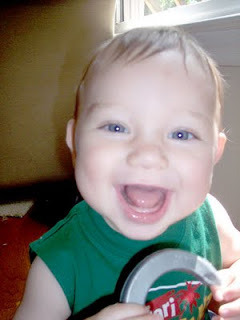
See that gummy little pirate? Without him, I probably wouldn't be a writer.
I mean, before him, I blogged and did reviews and wrote snappy copy for brochures. But I never thought I was capable of writing an actual novel until he was about 9 months old.
And that's when I went crazy.
Why? Oh, lots of reasons. The constant demands of two children under three, the lack of sleep, the nighttime hallucinations.
That's right-- my first viable book was inspired by HALLUCINATIONS.
I was in the dark, trying to coax him to sleep, when I hallucinated that there were rats in the house who were actually tiny, magical, terrible people.
So I wrote it, because when you're so sleepy that you're hallucinating, sometimes you forget what is and is not possible. I had forgotten my limits. I had forgotten the fear of failing. I accepted that things were going to be messy and strange for a while, and that book became my path to sanity.
That's the book that attracted my agent, and that's the agent who sold my next book.
My son is almost four now, and I've written ten books since the day that picture was taken. I write when my children are asleep, when they're at school, when they're crouched under a blanket fort, watching Happy Feet on a portable DVD player. My writing may have grown out of a moment of weakness and, yes, madness. But it's become a career and part of my identity. Now, I don't know what I would do without it.
Everyone has a breaking point, and for me, it was lying awake at night beside a restless baby, crying on his bald little head, trying to figure out how to be a mother when I couldn't function as a person. Writing became my island, my escape. It gave me something to focus on outside of myself and my children and my family. I think everyone needs that island.
The next step will be writing a book my children can actually read, preferably something with a cover that doesn't include a half-naked dude.
And the dedication will read:
To my own favorite monsters, who started everything. I helped make you, and then you helped make me. With thanks and love, Mom.
*
Published on July 11, 2012 08:08
July 10, 2012
How to Kill Your Darlings
Sorry, honey. But the tighter you clutch it, the more it needs to go. You have to kill your darlings if you want to move forward as a writer. Here's how.
1. BUT THIS IS WHERE IT HAS TO BEGIN. Really? Says who? What would happen if it started earlier? Faster? Did you start with a dream, a character looking in the mirror, or a scene that involves disgusting bodily functions? Are you completely unwilling to compromise that first line at all? If so, you probably need to kill it. Resave your doc and start hacking.
2. BUT THIS IS THE PERFECT METAPHOR. Um, guess what? No one really cares. Being cute/clever doesn't win over the reader. Type the word "like" into the Find search box and see if you can slice out any of that gristle. Of course, *I* don't have to-- my agent murders them all like a badger at a kitten tea party.
3. BUT I CAN'T LET THAT CHARACTER SUFFER. You want to hear a book idea that never sold? "The perfect girl lived a happy life and got everything she wanted. The end." If you want the reader to care about your protagonist, she has to be just as flawed and strange as the rest of us. Don't make her a pariah, but make sure she has quirks, fears, struggles, and secret pain. And then see what else you can throw at her. Suffering makes us unique and ties us together, and we don't tend to like people who avoid the Noid of Turmoil.
4. BUT I NEED THIS SCENE. I see. You need it. But why? Because it moves your plot and character arc forward as no other scene can, or because it's cute or pretty or clever or came to you in a dream? If a scene isn't working and you keep trying to force it like a falling Tetris block, it might need to go. Or maybe that block fits somewhere else. The point is, if it sticks out like a sore thumb, prune it.
5. BUT THE NAME IS CLEVER. Oh, honey. No. You may not name your angel-masquerading-as-a-teen Michael Gregori. You are disallowed from calling a vampire Vlad or Spike. You are strictly forbidden from naming the villain Cruella deVil. I mean, seriously, do you think some poor woman gave birth to a chubby, yummy baby and said, "YOU WILL ONE DAY BE CRUEL, CRUELLA. MUAHAHA!" No. A name may "sound" good or dark or have a nice ring to it, but you're not fooling anyone anymore. Adolf and Damian were once really popular names and didn't take on nefarious feels until society dubbed it so. Most guys are actually named John or Jack or Steve. True story.
6. BUT THAT'S NOT THE WAY THE STORY GOES. Guess what, buttercup? If an agent wants to see revisions or an editor buys your story, things are going to change. How much do you want to move forward? What sacrifices are you willing to make? If you're not willing to change something for an agent, how willing will you be when an editor tells you flat-out that they require further changes to your precious angel? As I see it, once someone has sent me a check, I no longer own the story. They're my boss, and I have to make them happy, and if that means my heroine is now named Helga and she has a magical wooden leg, SO BE IT. If you don't want to play by those rules, I suggest you never try to have a book traditionally published and just write because you love it, which is a perfectly reasonable thing to do.
7. BUT WHAT IF I CUT OUT THE WORDS AND THEY'RE GONE FOREVER AND IT'S NEVER THAT GOOD AGAIN AND WOE? Um, that's why you save the old draft and rename it before making changes. Hell, email it to yourself, if you're paranoid. Then start over fresh, bravely slicing paragraphs and giving yourself vast tracts of white space to fill with shiny new words. I've written ten books in three years now, and here's the honest-to-God truth: I've never once gone back to the original after making revisions. Throw your old shoes in the closet, lace on the new pair, take off running, and never look back.
8. BUT THIS IS HOW IT ENDS. Really? Show me where that's carved in stone. There are infinite ways to end a story and infinite ways to write those endings. What the writer wants to say isn't always what the reader wants to hear, and the ending will majorly determine if someone who finishes this book will pick up your next book. If an agent, editor, or writer you trust suggests a different way to end your book, at least consider it. It's easy to cling to the ending, just as it's easy to cling to the beginning.
9. BUT YOU SAID WE WERE DONE. Bad news. One round of revisions is rarely enough. Sometimes, the first big revision doesn't fully knit the story together. Sometimes, it just shows you how messed up things really are. And sometimes, like me, you rush through it and get sent firmly back with a smacked nose to do the dirty work. Even if your first big, painful, surgical, messy revision fixes things, you'll still have to go in repeatedly to smooth things over and pretty them up. And then come the copy edits. Heaven help you.
10. BUT EVERYONE WILL LOVE IT. Let me kill this darling for you right now: not everyone will love your book. Some people will probably hate it. Many people will feel indifferent, won't finish it, or will find things about it that make them squawk vehemently in their reviews. Kill the darling within you that wants to be universally liked. Kill the part of you that lets other people determine your value based on the number of roses or bullets or kissy-lips they give you on their blog. Kill that soft, squishy place in your heart that actually reads the one-star reviews. Kill that last darling, darling, and you'll be free.
Any other thoughts on the killing of darlings?
*
1. BUT THIS IS WHERE IT HAS TO BEGIN. Really? Says who? What would happen if it started earlier? Faster? Did you start with a dream, a character looking in the mirror, or a scene that involves disgusting bodily functions? Are you completely unwilling to compromise that first line at all? If so, you probably need to kill it. Resave your doc and start hacking.
2. BUT THIS IS THE PERFECT METAPHOR. Um, guess what? No one really cares. Being cute/clever doesn't win over the reader. Type the word "like" into the Find search box and see if you can slice out any of that gristle. Of course, *I* don't have to-- my agent murders them all like a badger at a kitten tea party.
3. BUT I CAN'T LET THAT CHARACTER SUFFER. You want to hear a book idea that never sold? "The perfect girl lived a happy life and got everything she wanted. The end." If you want the reader to care about your protagonist, she has to be just as flawed and strange as the rest of us. Don't make her a pariah, but make sure she has quirks, fears, struggles, and secret pain. And then see what else you can throw at her. Suffering makes us unique and ties us together, and we don't tend to like people who avoid the Noid of Turmoil.
4. BUT I NEED THIS SCENE. I see. You need it. But why? Because it moves your plot and character arc forward as no other scene can, or because it's cute or pretty or clever or came to you in a dream? If a scene isn't working and you keep trying to force it like a falling Tetris block, it might need to go. Or maybe that block fits somewhere else. The point is, if it sticks out like a sore thumb, prune it.
5. BUT THE NAME IS CLEVER. Oh, honey. No. You may not name your angel-masquerading-as-a-teen Michael Gregori. You are disallowed from calling a vampire Vlad or Spike. You are strictly forbidden from naming the villain Cruella deVil. I mean, seriously, do you think some poor woman gave birth to a chubby, yummy baby and said, "YOU WILL ONE DAY BE CRUEL, CRUELLA. MUAHAHA!" No. A name may "sound" good or dark or have a nice ring to it, but you're not fooling anyone anymore. Adolf and Damian were once really popular names and didn't take on nefarious feels until society dubbed it so. Most guys are actually named John or Jack or Steve. True story.
6. BUT THAT'S NOT THE WAY THE STORY GOES. Guess what, buttercup? If an agent wants to see revisions or an editor buys your story, things are going to change. How much do you want to move forward? What sacrifices are you willing to make? If you're not willing to change something for an agent, how willing will you be when an editor tells you flat-out that they require further changes to your precious angel? As I see it, once someone has sent me a check, I no longer own the story. They're my boss, and I have to make them happy, and if that means my heroine is now named Helga and she has a magical wooden leg, SO BE IT. If you don't want to play by those rules, I suggest you never try to have a book traditionally published and just write because you love it, which is a perfectly reasonable thing to do.
7. BUT WHAT IF I CUT OUT THE WORDS AND THEY'RE GONE FOREVER AND IT'S NEVER THAT GOOD AGAIN AND WOE? Um, that's why you save the old draft and rename it before making changes. Hell, email it to yourself, if you're paranoid. Then start over fresh, bravely slicing paragraphs and giving yourself vast tracts of white space to fill with shiny new words. I've written ten books in three years now, and here's the honest-to-God truth: I've never once gone back to the original after making revisions. Throw your old shoes in the closet, lace on the new pair, take off running, and never look back.
8. BUT THIS IS HOW IT ENDS. Really? Show me where that's carved in stone. There are infinite ways to end a story and infinite ways to write those endings. What the writer wants to say isn't always what the reader wants to hear, and the ending will majorly determine if someone who finishes this book will pick up your next book. If an agent, editor, or writer you trust suggests a different way to end your book, at least consider it. It's easy to cling to the ending, just as it's easy to cling to the beginning.
9. BUT YOU SAID WE WERE DONE. Bad news. One round of revisions is rarely enough. Sometimes, the first big revision doesn't fully knit the story together. Sometimes, it just shows you how messed up things really are. And sometimes, like me, you rush through it and get sent firmly back with a smacked nose to do the dirty work. Even if your first big, painful, surgical, messy revision fixes things, you'll still have to go in repeatedly to smooth things over and pretty them up. And then come the copy edits. Heaven help you.
10. BUT EVERYONE WILL LOVE IT. Let me kill this darling for you right now: not everyone will love your book. Some people will probably hate it. Many people will feel indifferent, won't finish it, or will find things about it that make them squawk vehemently in their reviews. Kill the darling within you that wants to be universally liked. Kill the part of you that lets other people determine your value based on the number of roses or bullets or kissy-lips they give you on their blog. Kill that soft, squishy place in your heart that actually reads the one-star reviews. Kill that last darling, darling, and you'll be free.
Any other thoughts on the killing of darlings?
*
Published on July 10, 2012 17:14
July 9, 2012
Revision Won't Kill You (Probably)
Revising is:
*necessary
*often painful
*demanding
*worthwhile
*serious
*the equivalent of surgery
*something that even the most famous and talented writers do
*something that you, therefore, will have to do, no matter what your mom says
Revising is not:
*fun
*easy
*something that can be done in two days
*something that you should feel antagonistic about
*something that you only need to do once
*something that can be done lightly or playfully
*something that you can cheat at
*more exciting than eating pistachio gelato
Revising requires:
*looking at the big picture
*being willing to make sweeping changes
*being open to hitting the delete button a lot
*closely considering motivation, plot, pacing, and the character arc
*taking notes, making comments on comments, drawing a timeline, or graphing things out
*spreadsheets
*knowing when to hold on and when to let go and when to fight for things you need
*lots of coffee
*lots of sugary pastries/chocolate as goal-inspired treats
*not drinking the entire bottle of wine, even when you want to
Not putting your all into your revisions means:
*your writing won't improve
*your agent and editor will say nasty things behind your back
*you're not learning anything
*your book is still broken has not yet reached its full potential (revised! thanks to my editor!)
*you're holding yourself back
Revising will not:
*ruin your book
*kill you (probably)
Therefore, I invite you to join me in fighting the good fight. Revising is not the battle, it's the war.
ON MY WORD, UNLEASH TRACK CHANGES!
*
*necessary
*often painful
*demanding
*worthwhile
*serious
*the equivalent of surgery
*something that even the most famous and talented writers do
*something that you, therefore, will have to do, no matter what your mom says
Revising is not:
*fun
*easy
*something that can be done in two days
*something that you should feel antagonistic about
*something that you only need to do once
*something that can be done lightly or playfully
*something that you can cheat at
*more exciting than eating pistachio gelato
Revising requires:
*looking at the big picture
*being willing to make sweeping changes
*being open to hitting the delete button a lot
*closely considering motivation, plot, pacing, and the character arc
*taking notes, making comments on comments, drawing a timeline, or graphing things out
*spreadsheets
*knowing when to hold on and when to let go and when to fight for things you need
*lots of coffee
*lots of sugary pastries/chocolate as goal-inspired treats
*not drinking the entire bottle of wine, even when you want to
Not putting your all into your revisions means:
*your writing won't improve
*your agent and editor will say nasty things behind your back
*you're not learning anything
*your book is still broken has not yet reached its full potential (revised! thanks to my editor!)
*you're holding yourself back
Revising will not:
*ruin your book
*kill you (probably)
Therefore, I invite you to join me in fighting the good fight. Revising is not the battle, it's the war.
ON MY WORD, UNLEASH TRACK CHANGES!
*
Published on July 09, 2012 16:48
July 8, 2012
10 Tips for Barfing a Book
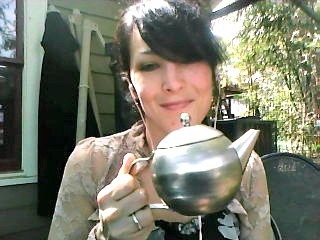 See that picture?
See that picture?That's a picture of me, barfing.
Metaphorically.
Because I was writing a first draft, and I tend to think of my first drafts like barf.
That is to say... they come out fast and furious in one big, violent rush that I can't really stop. And what comes out is messy, chunky, and made of lots of disparate elements blended ungracefully together.
Oddly enough, the final book, I hope, is more like a five-course meal. That starts as barf and gets edited, rearranged, and polished until it's presentable. And the great thing about barfing is that anyone can do it!
So here's my guide to barfing out a first draft.*
1. DON'T LOOK BACK. If you reread what you wrote yesterday or the paragraph you just finished, you might find yourself caught in an endless loop of polishing. Barrel firmly forwards, willy-nilly and pell-mell, even if you know you'll have to change something later. First drafts are skeletons. You can add muscle and skin to pretty it up later. Even Stephen King admits his first drafts suck.
2. DON'T BE SCARED TO MESS UP. Here's the big secret: YOU'RE GOING TO MESS UP. Probably a lot. I do. Don't let it stop you. You can change point of view or tense half-way through your draft. You can change *anything* at any time, right up until your work is in print. Accept that mistakes, typos, and major draft surgery are part of the process. Fix it on the second draft.
3. IF YOU GET STUCK, DROP A GUMDROP AND KEEP GOING. If I'm not sure about something, can't get a scene to work, or need to do some more research, sometimes I'll just mark it with [need more] or [insert party scene here] or [kill him somehow and make it good] and keep going. Don't get hung up on something you can fill in later, when you've got it all figured out. That's how Hansel and Gretel got out of the forest, right?
4. BE SELFISH. If you feel passionate about writing, then carve out what you need. Time, space, all the Hershey's Kisses. For at least a little while, the people who love you should honor and understand your need to pursue your goal. Yes, it will grate on their nerves if it goes on too long, but the first draft is the most crucial part. You might need to stay up late writing instead of watching Game of Thrones or go out for a few hours in the afternoon to write. It's okay. Everyone deserves space to pursue their dreams.
5. HAVE A PLAYLIST. I have an album or playlist for every single book or novella I've written. I keep them on Spotify, and when I'm stuck or getting ready to pound out a scene, I listen to it. The playlist is thematically or dramatically related to the story and drops me right back into that world. I do a lot of problem-solving in the car while rocking out or in the bathtub while trancing out. Trust the playlist.
6. DON'T LET ANYONE READ ANYTHING UNTIL IT'S DONE AND POLISHED. Don't let your significant other, critique group, writing partner, or online friends read ANYTHING, EVER. The slightest nose wiggle or indifferent shrug can kill your passion for a story. Get the first draft out, then give yourself at least one more draft to polish it before letting that baby deer wobble out into the world.
7. MEDITATE. Not in lotus position or anything. Sometimes, when a writer starts out fast and furious and then rolls to a halt, it can mean that they haven't thought through the story far enough. Think about it as you fall asleep, as you wake up, while driving. Take notes. Imagine the scene, possibly even outline it before you write it. If you don't know where you're going, you don't know how to get there.
8. MAKE EACH SCENE YOUR FAVORITE. You know how there are some scenes in books that you just skim through, and it feels like the writer was just filling in space to get to the exciting/juicy scene after it? You don't want to do that. There should be something in each scene that you look forward to writing, whether it's snappy dialog or intriguing world-building or the first whiff of a later twist. If the scene is boring for you to write and edit, your readers will get bored, too.
9. SET UP IDEAL CONDITIONS. My recipe for 10,000 words per day involves getting dressed up in a pretty skirt and heels, going to a favorite coffee shop, putting in noise-canceling earbuds and my playlist, ordering coffee and a treat, and writing uninterrupted for as long as possible. Your recipe may be totally different, but once you know what it is, set up your opportunities to optimize output as often as possible. And don't waste your time trying to work in uncomfortable or annoying conditions. Set yourself up for success!
10. BE OPEN TO POSSIBILITY. Sometimes the best characters walk in out of nowhere and steal the scene. Sometimes your character makes a decision you weren't expecting, and it changes the entire course of the story. Sometimes you discover something entirely new during dialog. Let it happen. Your subconscious is brilliant and will feed you lines from offstage, if you let it.
Go forth and barf!
*If anyone has any questions about writing, please ask! I'll do my best to answer.
*
*Mileage may vary. Every writer is different, every book is different. Find your way. I believe in you!
Published on July 08, 2012 13:54
July 7, 2012
no flash; plenty of fiction
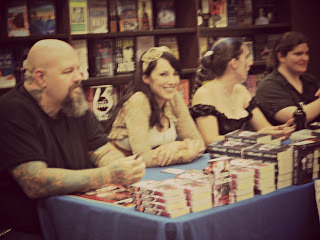
Had an AMAZING time tonight at the Second Annual Fantastical Mystery Tour.
Sorry the pic is all waggly-- we forgot to turn on the flash.
To the left is my good friend, urban fantasy author James R. Tuck, writer of the Deacon Chalk, Occult Bounty Hunter series from Kensington.
To the right is new friend Kalayna Price, who writes the Alex Craft books from Roc. Her third book, Grave Memory, launched this week, and she was kind and generous enough to invite several other authors around the southeast to sign with her.
And now, I'm staying in a hotel with a vault in the lobby.
That's right. A VAULT.

They turned it into a martini bar. We went inside for a minute. But nothing inside could compare to the door, so we left.
One of the neatest things about tonight was getting to meet people who had read the book and enjoyed it. In case you're wondering if your kind words or dog-eared paperback mean anything to an author, I tell you honestly that THEY MEAN THE WORLD. Brandon, Terry, Vikki, Samantha, Melissa, Karen, Sara, Emily, Barbara, Cody, and everyone who stepped up with a smile: THANK YOU! Y'all rock!
I also met amazing authors, heard some interesting stories, enjoyed a lot of book talk, and ate some danged good caramel cake.
In conclusion, I'm lucky as hell.
*
Published on July 07, 2012 20:31
July 6, 2012
the exception to the rule
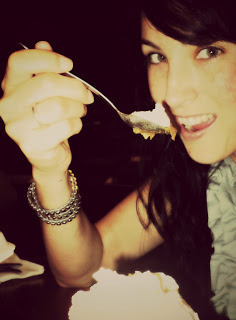 See that?
See that?That's something you've never seen before, even if you've been reading my blog since 2007.
That's me eating... pie.
And I hate pie.
Usually.
But occasionally, I'll succumb to my grandmother's chocolate pie.
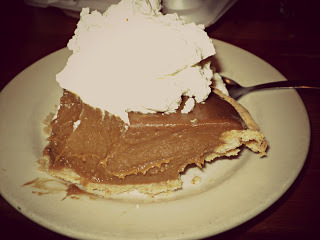
Or a quarter-pan of the Butterscotch Pie at Greenwood's Restaurant in my home town.
The only dessert they serve is pie, you see. And if it comes down to pie or nothing?
I choose pie.
Well, as long as it doesn't include any sort of fruit or meringue or coconut. Blech.
It's a big part of me, how much I hate pie. For someone so serious about their love of cake that they use it in their online profiles, there needs to be some strange, eccentric negative. I love cake; I hate pie. It's part of what makes me a character. And so when I'm writing, I always try to think about those little details that make characters deeper. For every positive in a character, there's a negative. For everything they love, there's something they hate with equal fervor. They have to be real, and that means they have to be quirky.
So that's my gift to you. Make up a character who hates pie.
Then wait until the day they actually eat pie... and never let 'em forget.
*
Published on July 06, 2012 16:12



